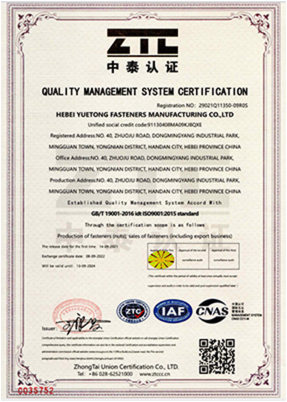ное. . 14, 2024 08:18 Back to list
anchor bolt types
Understanding Anchor Bolt Types A Comprehensive Guide
Anchor bolts are essential components in construction and engineering, providing critical support and stability to structures. These bolts secure various elements, from building frames to machinery, ensuring safety and durability. Understanding the different types of anchor bolts is vital for anyone involved in construction, allowing for the selection of the appropriate type for specific applications. This article delves into the various anchor bolt types, their uses, and benefits.
1. Expansion Anchor Bolts
Expansion anchor bolts are designed to grip the surrounding material tightly when installed. They consist of a bolt with a sleeve that expands as the bolt is tightened. This type is ideal for concrete applications where a strong hold is necessary. The expansion mechanism ensures that the anchor can support heavy loads while preventing pull-out under stress. Expansion anchors are often used in applications such as securing structural steel, heavy machinery, and even railings.
Sleeve anchor bolts combine the features of expansion bolts and mechanical anchors. They are popular for fastening items to concrete or masonry surfaces. When installed, the sleeve expands to grip the sides of the hole in the base material, creating a secure hold. Sleeve anchors are versatile and can be used both indoors and outdoors for various applications, including mounting equipment, brackets, and fixtures.
3. Wedge Anchor Bolts
Wedge anchors are heavy-duty fasteners that provide a secure hold in concrete. They consist of a threaded rod with a cone-shaped end that, when inserted into a pre-drilled hole, creates a wedge effect to anchor firmly into the concrete. This type of bolt is perfect for high-load applications, making them a popular choice for structural connections, machinery, and heavy equipment installations.
anchor bolt types

4. Chemical Anchor Bolts
Chemical anchor bolts use a bonding agent, such as epoxy, to secure themselves into the base material. This innovative approach allows for high load capacities and is particularly advantageous in applications where traditional mechanical anchors may be insufficient. Chemical anchors work well in installations subjected to vibrations or dynamic loads, such as in seismic areas or near heavy machinery.
5. Lag Shields
Lag shields are primarily used for fastening wood elements to masonry, concrete, or brick. They consist of a metal sleeve or shield that expands when a lag screw is installed. This type of anchor is especially useful in applications like attaching wooden structures, furniture, or wall fixtures to solid surfaces.
6. Roofing Anchors
For roofing applications, special anchor bolts are designed to secure structures, equipment, or safety equipment on rooftops. These anchors ensure that items remain securely fastened, even in high-wind conditions or extreme weather. Roofing anchors are crucial for safeguarding against accidents and ensuring that equipment remains stable.
Conclusion
Selecting the right anchor bolt type is critical for the longevity and reliability of any construction project. Each type of anchor bolt serves a unique purpose and is suited for specific applications, ensuring structural integrity and safety. Understanding these differences enables builders, engineers, and contractors to make informed decisions, ultimately leading to successful construction outcomes. Whether it’s expansion anchors for concrete, sleeve anchors for versatility, or chemical anchors for high-stress applications, the appropriate choice ensures that structures remain safe and reliable for years to come.
-
Threaded Rods in Art Where Structural Integrity Meets Aesthetic Vision
NewsApr.11,2025
-
Optimize Industrial Fastening with Precision-Crafted Hex Nut Solutions
NewsApr.11,2025
-
Master Fastening with Premium Stainless Steel Carriage Bolts
NewsApr.11,2025
-
Hex Sleeve Anchors: Smart Choice for Industrial-Grade Concrete Fastening
NewsApr.11,2025
-
Hex Head Timber Screws: Reinventing Safety in Modern Livestock Enclosures
NewsApr.11,2025
-
Elevate Efficiency with Robust Beam Clamps
NewsApr.11,2025


